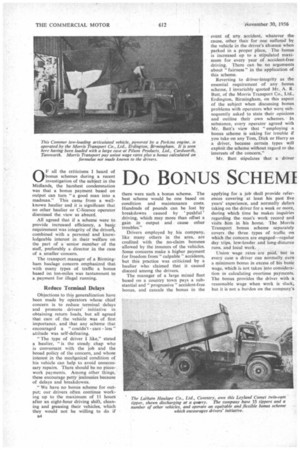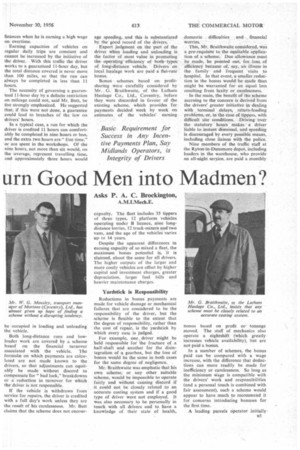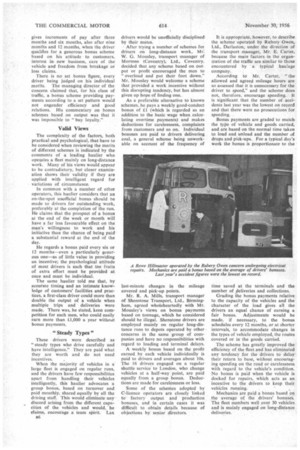Do BONUS SCHEMI
Page 38

Page 39

Page 40

If you've noticed an error in this article please click here to report it so we can fix it.
urn Good Men into Madmen?
Asks P. A. C. Brockington, Basic Requirement for Success in Any Incentive Payments Plan, Say Midlands Operators, is Integrity of Drivers
OF all the criticisms I heard of bonus schemes during a recent investigation of the subject in the Midlands, the harshest condemnation was that a bonus payment based on output can turn "a good man into a madman." This came from a wellknown haulier and it is significant that no other haulier or C-licence operator dismissed the view as absurd.
All agreed that if a scheme were to provide increased efficiency, a basic requirement was integrity of the drivers, combined with a personal and knowledgeable interest in their welfare on the part of a senior member of the staff, preferably a director in the case of a smaller concern.
The transport manager of a Birmingham haulage concern emphasized that. with many types of traffic a bonus based on ton-miles was tantamount to a payment for illegal running.
Reduce Terminal Delays
Objections to this generalization have been made by operators whose chief concern is to reduce terminal delays and promote . drivers' initiative in obtaining return loads, but all agreed that care of . the vehicle was of first importance, and that any scheme that encouraged a "couldn't care less" attitude was self-defeating.
"The type of driver I like," stated a haulier, " is the steady chap who is conversant with the job and the broad policy of the concern, and whose interest in the mechanical condition of his vehicle can help to avoid unnecessary repairs. There should be no piecework payments. Among other things, these encourage petty jealousies because of delays and breakdowns.
"We have no bonus scheme for output; our drivers often continue working up to the maximum of II hours after an eight-hour driving shift, cleaning and greasing their vehicles, which they would not be willing to do if B4 there were such a bonus scheme. The best scheme would be one based on condition and maintenance costs. Hundreds of pounds can be lost by breakdowns caused by • pushful ' driving, which may more than offset a gain in output and cause other troubles."
Drivers employed by his company. like many others in the area, arc credited with the no-claim bonuses -allowed by the insurers of the vehicles. Some concerns make a higher payment for freedom from " culpable" accidents, but this practice was criticized by a haulier who claimed that it caused discord among the drivers.
The manager of a large mixed fleet based on a country town pays a substantial and " progressive" accident-free bonus, and cancels the bonus in the
event of any accident, whatever the cause, other than for one suffered by the vehicle in the driver's absence when parked in a proper place, The bonus is increased up to a stipulated maximum for every year of accident-free driving. There can be no arguments about " fairness" in the application of this scheme.
Reverting to driver-integrity as the essential requirement of any bonus scheme. I invariably quoted Mr.. A. R. Butt, of the Morris Transport Co., Ltd., Erdington, Birmingham, on this aspect of the subject when discussing bonus problems with operators who were subsequently asked to state their opinions and outline their own schemes. In substance, every operator agreed with Mr. Butt's view that "employing •a bonus scheme is asking for trouble if you take on any Tom, Dick or Harry as a driver, because certain types will exploit-the scheme without regard to the interests of the concern."
Mr. Butt stipulates that a driver
applying for a job shall provide references covering at feast his past five years' experience, and normally defers taking on the driver for a week or more, during which time he makes inquiries regarding the man's work record and visits him in his home. The Morris Transport bonus scheme separately covers the three types of traffic on which the concern are engaged—regular day trips, low-loader and long-distance runs, and local work.
Union wage rates are paid, but in every case a driver can normally earn a minimum bonus in excess of his basic wage, which is not taken into consideration in calculating overtime payments. The bonus provides the driver with a reasonable wage when work is slack, but it is not a burden on the company's
finances when he is earning a high wage on overtime.
Earning capacities of vehicles on regular daily trips are constant and cannot be increased by the initiative of the driver. With this traffic the driver works to a guaranteed 11-hour day, but the total distance covered is never more than 100 miles, so that the run can always be completed in less than 11 hours.
The necessity of governing a guaranteed II-hour day by a definite restriction on mileage could not, said Mr. Butt, be too strongly emphasized. He suggested that, if this were not done, a guarantee could lead to breaches of the law on drivers' hours.
In a typical case, a run for which the driver is credited 11 hours can comfortably be completed in nine hours or less, and the extra two hours arc" free time," or are spent in the workshops. Of the .nine hours, not more than six would, On the 'average, represent travelling time, and approximately three hours would
be occupied in loading and unloading the vehicle.
Both long-distance runs and lowloader work are covered by a scheme based on the financial turnover associated with the vehicle. The forrnula5 on which payments are calculated are not made known to the drivers, so that adjustments can equitably be made without discord to compensate for" bad luck," breakdowns or a reduction in turnover for which the driver is not responsible.
If the vehicle is withdrawn from service for repairs, the driver is credited with a full day's work unless they are the result of his carelessness. Mr. Butt claims that the scheme does not encour
age speeding, and this is substantiated by the good record of the drivers.
Expert judgment on the part of the driver when loading and unloading is the factor of most value in promoting the operating efficiency of• both types` of long-distance vehicle. Drivers on local haulage work are paid a flat-rate. bonus.
Bonus schemes based on profitsharing were carefully considered by Mr. G. Braithwaite, of the Latham Haulage Co., Ltd., Coventry, before they were discarded in favour of the existing scheme, which provides for payments decided week by week on estimates of the vehicles' earning
capacity. The fleet includes 35 tippers of three types, 12 platform vehicles, operating under B licence, nine longdistance lorries, 12 truck-mixers and two vans, and the age of the vehicles varies up to 14 years.
Despite the apparent differences in earning capacity of so mixed a fleet, the maximum bonus potential is, it is claimed, about the same for all drivers. The higher outputs of the larger and more costly vehicles are offset by.higher capital and investment charges, greater depreciation, larger fuel bills and heavier maintenance charges.
Yardstick is Responsibility Reductions in bonus payments are made for vehicle damage or mechanical failures that are considered to be the responsibility of the driver, but the scheme is flexible to the extent that the degree of responsibility, rather than the cost of repair, is the yardstick by which every case is judged.
For example, one driver might be held responsible for the fracture of a half-shaft and another for the disintegration of a gearbox, but the loss of bonus. would be the same in both cases for the same degree of negligence.
Mr. Braithwaite was emphatic that his own scheme, or any other suitable scheme, would be impossible to operate fairly and without causing discord if it could not be closely related to an accurate costing system and if a good type of driver were not employed. It was also necessary to be personally in touch with all drivers and to have a knowledge of their stale of health,
domestic . difficulties and . financial worries.
This, Mr. Braithwaite considered, was a pre-requisite to the equitable application of a scheme. Due allowance must be made, he pointed out, for ..loss, of efficiency because of, say, an illness in the family and frequent visits to hospital. In that event, a smaller reduction in the bonus would be made than might be warranted for an equal loss resulting from laxity or. careIesSness.
In the main, the benefit of the scheme accruing to the concern is derived from the drivers' greater initiative in dealing with terminal ,delays, return-loading problems, or, in the case of tippers, with difficult site Conditions. Driving bver the statutory hours makes a driver liable to instant dismissal, and speeding is discouraged by every possible means, including close liaison with the police.
Nine members of the traffic staff at the Ryton-in-Dunsmore depot, including loaders in the warehouse, who provide an all-night seryice, are paid a monthly
bon us based on profit or tonnage moved, The staff of mechanics also operate a nightshift (which greatly increases vehicle availability), but are not paid a bonus.
In a number of schemes, the bonus paid can -be compared with a wage increase, with the difference that deductions can more readily be made for inefficiency or carelessness. So long as the minimum wage is compatible with the drivers' work and responsibilities (and a personal touch is combined with fair assessment), such a scheme would appear to have much to recommend it for concerns introducing bonuses for the first time.
A leading parcels operator initially n5
gives increments of pay after three months and six months, also after nine months and 12 months, when the driver qualifies for a generous bonus scheme based on his attitude to customers, interest in new business, care of the vehicle and freedom from breakage or loss claims.
There is no set bonus figure, every driver being judged on his individual merits. The managing director of the concern claimed that, for his class of traffic, a bonus scheme providing payments according to a set pattern would not engender efficiency and good relations. His commentary on bonus schemes based on output was that it was impossible to "buy loyalty."
Valid Views
The complexity of the factors, both practical and psychological, that have to be considered when reviewing the merits of different schemes is indicated by the comments of a leading haulier who opecates a fleet mainly on long-distance work. Many of his views would appear to be contradictory, but closer examination shows their validity if they are applied with intelligent regard for variations of circumstance.
In common with a number of other operators, this haulier considers that an on-the-spot unofficial bonus should be made to drivers for outstanding work, preferably at the completion of the run. He claims that the prospect of a bonus at the end of the week or month will have a far less favourable effect on the man's willingness to work and his initiative than the chance of being paid a substantial reward at the end of the day.
He regards a bonus paid every six or 12 months—even a particularly generous one—as of little value in providing an incentive; the psychological attitude of most drivers is such that tne fruits of extra effort must be provided at once and must be individual.
The same haulier told me that, by accurate timing and an intimate knowledge of customers' facilities and practices, a first-class driver could more than double the output of a vehicle when multiple trips and deliveries were made. There was, he stated, keen competition for such men, who could easily earn more than £1,000 a year without bonus payments.
"Steady Types"
These drivers were described as "steady types who drive carefully and have intelligence." They are paid what they are worth and do not need incentives.
When the majority of vehicles in a large fleet is engaged on regular runs, and the drivers have few responsibilities apart from handling their vehicles intelligently, this haulier advocates a group bonus, based on turnover and paid monthly, shared equally by all the driving staff. This would eliminate any discord arising from the different capacities of the vehicles and would, he claims, encourage a team sPirit. Lax a6 drivers would be unofficially disciplined by their mates.
After trying a number of schemes for drivers on long-distance work, Mr: W. G. Mousley, transport manager of Mortons (Coventry), Ltd., Coventry, decided that any scheme based on output or profit encouraged the men to "overload and put their foot down." Mr. Mousley would welcome a scheme that provided a work incentive without this disrupting tendency, but has almost given up hope of finding one.
As a preferable alternative to known schemes, he pays a weekly good-conduct bonus of £.1 (which is regarded as an addition to the basic wage when calculating overtime payments) and makes deductions for carelessness, complaints from customers and so on. Individual bonuses are paid to drivers delivering coal, a general scheme being unworkable on account of the frequency of last-minute changes in the mileage covered and pick-up points.
Mr. R. A. Mills, transport manager of Shenstone Transport, Ltd., Birmingham, agreed wholeheartedly with Mr. Mousley's views on bonus payments based on tonnage, which he considered should be illegal. Shenstone drivers are employed mainly on regular long-distance runs to depots operated by other concerns in the same group of companies and have no responsibilities with regard to loading and terminal delays.
A weekly bonus based on the profit earned by each vehicle individually is paid to drivers and averages about 10s. The 16 drivers engaged on a regular shuttle service to London, who change vehicles at a half-way point, are paid equally from a group bonus. Deductions are made for carelessness or loss.
Some of the schemes adopted by C-licence operators are closely linked to factory output and production bonuses, and in certain cases it was difficult to obtain details because of objections by senior directors. It is appropriate, however, 10 describe the scheme operated by Rubery Owen, Ltd., Darlaston, under the direction of the transport manager, Mr. E. Carter, because the main factors in the organization of the traffic are similar to those encountered by a typical haulage company.
According to Mr. Carter, "the allowed and agreed mileage hours are so assessed that it is unnecessary for the driver to speed," and the scheme does not, therefore, encourage speeding. It is significant that the number of accidents last year was the lowest on record and that there were no prosecutions for speeding.
Bonus payments are graded to match the type of vehicle and goods carried, and are based on the normal time taken to load and unload and the number of drops and pick-ups. For a typical day's work the bonus is proportionate to the time saved at the terminals and the number of deliveries and collections.
Grading the bonus payments relative to the capacity of the vehicles and the character of the load gives all the drivers an equal chance of earning a fair bonus. Adjustments would be made, if necessary, to the bonus schedules every 12 months, or at shorter intervals, to accommodate changes in the types of vehicle employed, the routes covered or in the goods carried.
The scheme has greatly improved the efficiency of the fleet and has eliminated any tendency for the drivers to delay' their return to base, without encouraging speeding on the road or carelessness with regard to the vehicle's condition. No bonus is paid when the vehicle is docked for repairs, which acts as an incentive to the drivers to keep their vehicles running.
Mechanics are paid a bonus based on the average of the drivers' bonuses. The fleet numbers well over 30 vehicles and is mainly engaged on long-distance deliveries.




























































































